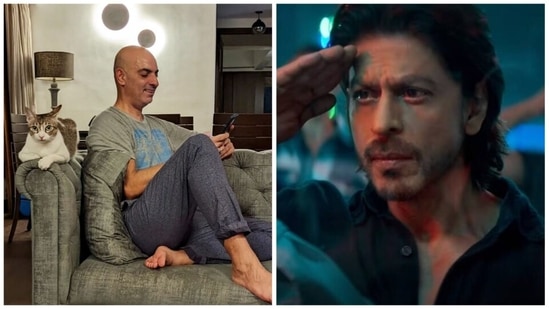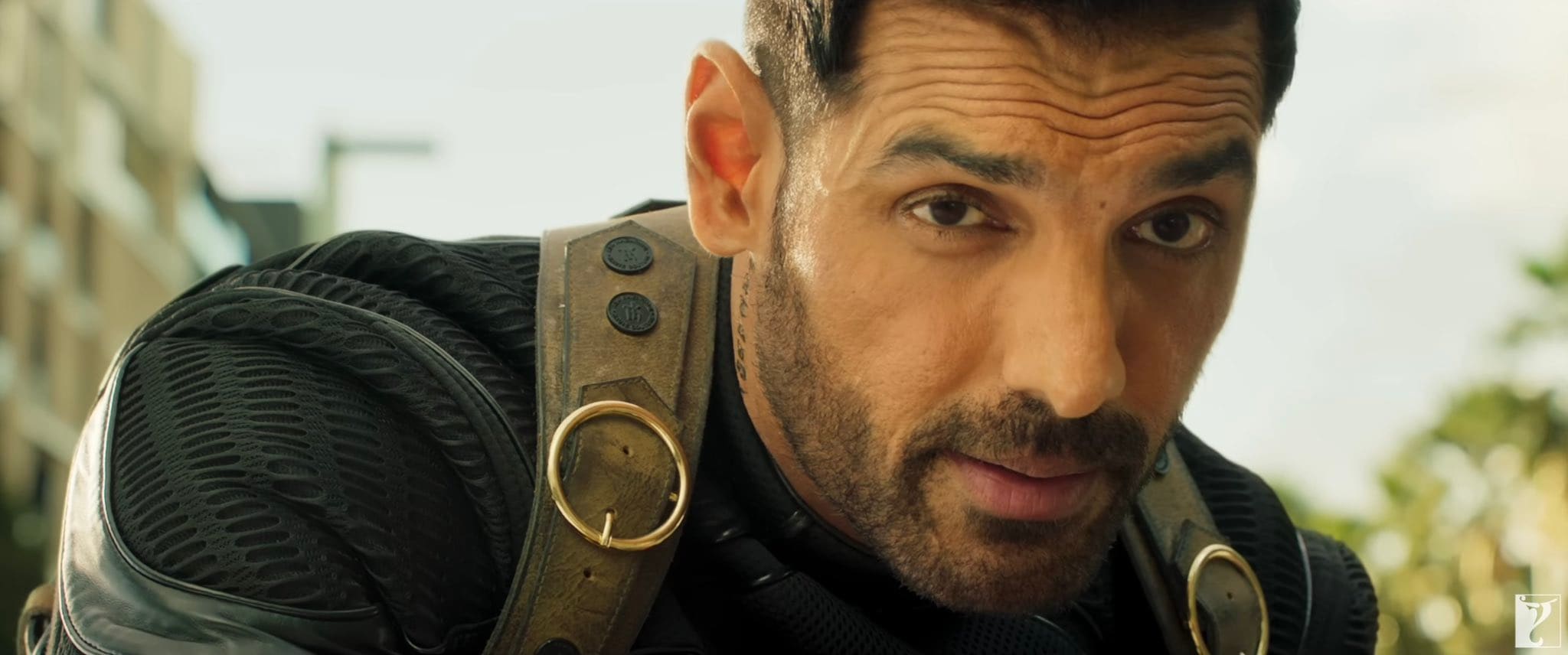Pathaan writer Abbas Tyrewala reveals the lines only Shah Rukh Khan could have said and ones that make him 'cringe'
Interview with Abbas Tyrewala: Pathaan dialogue writer tells us what went behind creating what could potentially be the biggest blockbuster in the history of Indian cinema.
After 2019's War, and now Pathaan, the winning team of director Siddharth Anand, screenplay writer Sridhar Raghavan and dialogue writer Abbas Tyrewala have made Bollywood blockbusters cool again. Aside from serving as the SRK comeback vehicle, at its best, Pathaan is a stardom-led blockbuster that knows it is one. A fan-service-fuelled superstar vehicle that doesn't take itself too seriously, done right. Instrumental to that is Abbas Tyrewala’s cheeky, self-aware dialogue. Abbas has previously penned the dialogue for a wide range of films including Salaam Namaste, Main Hoon Na and Munna Bhai MBBS. Not to mention making his own films like the beloved Jaane Tu Yaa Jaane Naa. (Also read: Siddharth Anand says 'boobles' line in Pathaan was improvised by Shah Rukh Khan)

Over the phone, Abbas spoke to me about crafting Pathaan’s seeti moments, merging Pathaan’s character with SRK’s presence, and that now-iconic post-credits scene with SRK and Salman.
Edited Excerpts:
What have the last two weeks been like? I imagine it’s been insane.
It’s just been really exciting to see people having this kind of fun with a movie. Celebrating, dancing in the aisles, and enjoying it in an old-world single-screen way, which we haven’t seen in a while. And, because my work on Pathaan finished two years before the release, while I’m delighted to be a part of the film, I actually enjoyed those lines more as an audience, because I don’t remember writing many of them (laughs).
People were hungry for Shah Rukh and they were hungry for a film that really entertained them. I think audiences have been struggling for a while to find their connection with Hindi films again. I also think that people somewhere felt hugely sympathetic towards Shah Rukh because of certain recent situations, in which he conducted himself with such immaculate dignity. I think people really wanted to see him triumph again. And those are things that no marketing team can anticipate or design.
Siddharth Anand recently said in an interview that the last thing he works on in his scripts is dialogue. He said you only start on the dialogue when the star is on board so that it can be shaped around them. What was the process of shaping the dialogue around the Shah Rukh Khan star presence?
Sid is absolutely right. I wrote it with the idea of Shah Rukh. But that’s not always the case. For example in War, I didn’t write for Hrithik, I wrote for the character of Kabir. There it was the presentation of Kabir that capitalized on Hrithik looking like a Greek God more than the dialogue.
In Pathaan the brief was a little different. We weren’t creating a character called Pathaan. We were creating a character that’s part Pathaan part Shah Rukh Khan. You don’t know whether it’s Shah Rukh breathing life into Pathaan or Pathaan breathing life into Shah Rukh.
The brief was that it should be a celebration of the Shah Rukh persona and his stardom. Siddharth wanted lines that were funnier than War, even at the cost of sometimes not necessarily being organic. That’s the trade-off with filmy dialogue, and that can sometimes backfire. But he really wanted this to be a party.
What were the lines that you thought could only come from Shah Rukh?
More than a line that only he could say, it’s more about writing lines that can be carried off by someone with the right degree of either self-deprecation or flamboyance. For example, having someone like Pathaan who refers to himself in the third person is always tricky territory. Like when he says “Party Pathaan ke ghar main rakhoge toh mehman nawazi ke liye Pathaan toh aayega”.
Or when he says “kursi ki peti bandh lo, mausam badalne wala hain”, in the helicopter when he puts on the sunglasses and looks super cool. A lot of actors wouldn’t be able to pull that off, but because it’s Shah Rukh, you’re enjoying the moment and buying into it. The thing with having a star like Salman or Shah Rukh is that you can get away with a degree of over-the-top flamboyance because they have the personalities that can carry it off. Whereas a more realistically inclined actor wouldn’t. Hrithik, for example, benefits from bringing all his experience into a character. Every time he’s tried to play a slightly larger-than-life character, it hasn’t gone half as well for him because in real life he’s actually a very shy, reserved, soft-spoken person. But with Shah Rukh and Salman, it’s almost like if you can’t sense their real-life personas in their performances, then there’s a certain audience that feels cheated.
Were there any lines that were improvised by SRK? I believe the “Boobles” joke came from him?
Yeah. He has done some degree of improvising. I mean the one line that people love is the way he says “Women” when he meets Rubai. For once it’s not someone referring to a woman in a derogatory sense but him referring to a woman kicking a**. That’s him, that’s Shah Rukh. A line like “boobles” I cringe and die at because it’s so not me (laughs) but people seem to find it funny. But that’s just par of the course. When someone gets so involved in a character, they will always bring themselves into it.
Were there any moments that really surprised you where you didn’t expect the audience to respond in a big way?
I was really surprised at the reaction to that last dialogue that goes “a soldier doesn't ask what the country has done for him but what he can do for his country”. I really didn't want that line. I spent my entire time and energy fighting it and trying to convince Siddharth and Adi Chopra not to have that line. After all this lovely dialoguebaazi, why are we quoting JFK? But they explained that, at that moment, with the amount of sympathy we’ve created for Jim and his past, we’re dangerously close to him feeling justified.
And that's the only line powerful enough to shut him up and end that final face-off they have. It doesn't matter what you went through, you’re a soldier and that sacrifice is what you signed up for, for your country. And when you watch the way the audience reacts when Pathaan says it, it’s clear my judgment was wrong.
Speaking of Jim, I imagine one of the biggest challenges when writing a film like this is the exposition where characters convey information to us. The shakiest exposition moment in the film was probably that final face-off where Jim says the only way to defuse the missile is with the device on his shoulder. What’s the art of writing exposition without feeling like you’re talking at the audience?

It’s the daal roti of any good dialogue writer to be able to communicate that information without making it seem like it’s being served up for the sake of it. And trying to mask that information in drama and what sounds like an organic exchange between characters. Having said that, it also boils down to how much you want to simplify things for the audience. With Pathaan, the degree to which Siddharth has ensured that everything is understood is a lot. I’m personally a lot more trusting of the audience and try to use a lot less exposition and trust them to fill in the gaps. But with the scale at which this film is being made, all the key stakeholders were reluctant to try anything other than something that's guaranteed to make sense to the audience even if it means spoonfeeding some things. But where possible, I have masked it and you won’t be aware of those moments because I’ve done it successfully.
There are definitely moments where the exposition is more cheeky and fun like when Shah Rukh explains the Russia heist to us and he calls them uncle and “Karen aunty”.
Exactly. You mask it in things like that. That’s exactly what it is.
The other Jim line that got everyone talking is his introduction line where he refers to the country as his ex-lover whereas Pathaan sees it as his mother. It positions Jim as someone with this toxic brand of nationalism. Is that what you were trying to convey?
That’s exactly it. The extreme of any emotion tends to easily slip into its opposite. So, once you’ve taken it to the point where the love for the country is the sum total of his life, and then when that person feels betrayed and decides he actually hates the country, then the degree of passion that he brought is the same as his hate. Its like a toxic ex-lover - I love you so much that I’m willing to die for you, but now I hate you so much that I’m willing to kill you. It’s that fanatical mentality which is exactly what's happened to Jim.
We also have to talk about the Shah Rukh-Salman scene - the insanely fun train set piece and the post-credits scene. It’s one of the most fun post-credits scenes I've ever seen. What went into writing that delightfully meta exchange between them?
That is a classic example of something that has nothing to do with the character or the movie and therefore nothing to do with me. That scene is all about Shah Rukh and Salman and not the characters. That's the scene where you follow Adi and Siddharth because they know what they're doing. That was totally conceived by them. Personally, I was worried about whether it would be too cheeky, but clearly not.
But I have to say, putting that moment straight after the train fight like it was originally meant to be, I don’t think would've been half as effective. That decision to put it as a post-credit sequence is a singular moment of genius, because, you’re right, people are responding to it more than any other post-credit scene.
I also wanted to ask about that touching Pathaan backstory moment when Rubai asks him if he’s Muslim and he says he doesn’t know because he’s an orphan who was found in a movie theatre. What were the discussions that went into that moment?
I wish I could shed any light on that one, but the conception of Pathaan’s background and backstory was already in place on a screenplay level. I wasn't part of those discussions about Pathaan’s background and what it communicates, I can only admire it. For me, what I personally loved was the humanity of an entire village becoming a family. That idea of knowing you love your country but your family is a village in another country and even though you’re not identifying as a Hindu or Muslim, you can still celebrate Eid with them without getting into the religion of it. I love that kind of very benign, noble, liberal secular take on life. I like people being warm and generous and appreciating each other and Pathaan’s character and Shah Rukh’s persona embody that so well. That generosity of spirit and that acceptance of people. I think, more than anything, it's that that has been the highlight of the film. A warm generous reaction towards Shah Rukh and, hopefully, toward each other.
Get more updates from Bollywood, Taylor Swift, Hollywood, Music and Web Series along with Latest Entertainment News at Hindustan Times.




